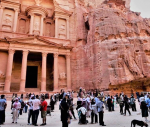You are here
Reconciliation for hope
Nov 12,2024 - Last updated at Nov 12,2024
In a broken world filled with power hierarchies, segregation, racism, hatred, and hostility between different ethnic groups, reconciliation shines and tops all other approaches to resolving conflict. Reconciliation gives hope and breaks vicious cycles of violence. Reconciliation is about the restoration of that which is broken. Meaning, it is about mending broken hearts, relationships, minds, souls and emotions.
Human co-existence and peace cannot merely depend on the enforcement of laws for civil order and deterrence, nor the formation of armies, the use of advanced weaponry, defined borders, or open trade agreements between nations. Genuine and transformative peace goes beyond the mere absence of violence and war. Peace studies scholar Johan Galtung has interestingly referred to this as negative peace. In addition to the absence of war and violence, positive peace, as he argues, is the absence of all negative attitudes, such as racism, hate, vengeance and resentment in people’s hearts towards one another. Positive peace happens when mindsets change and new visions are created by honouring all those involved in the relationship.
For decades, the Palestinian-Israeli conflict has been mitigated under the umbrella of conflict management rather than resolution, let alone reconciliation. Managing the conflict has proven to be a shameful failure. Managing the conflict is only concerned with preventing further escalations, violence and war. Using this approach has neglected and undermined Palestinians' rights and needs and rather focused on buying time for short-term wins and maneuvers for the Israeli side over the Palestinians. This is what the brokers of conflict have been doing for a long time.
Reconciliation in a broken and violent world may sound like a superstitious realm. But I would like to argue it is our only hope for a better future. Human co-existence and peace depend on the fruits of reconciliation which are embedded in dialogue, forgiveness, mutual trust, cooperation, collaboration and co-creating new visions collectively. On the other hand, if we look at resolution as an approach, it is concerned with finding immediate solutions regardless of restoring broken relationships.
His Majesty King Abdullah has championed the two-state solution and spoke widely about its importance worldwide. The two-state solution does not provide a mere resolution to the conflict, but also lays the foundation for a future with the possibility of reconciliatory work between the two nations. Anyone speaking ambitiously about a new Middle East cannot exclude the people at the heart of this conflict, namely the Palestinian people as His Majesty numerously repeated. Palestinians should have a say in this new vision and their voices must be heard.
The current ongoing war in Gaza and Lebanon only jeopardises any possibility for future collaboration or reconciliatory works given that tragedy, suffering, pain and death still overshadow Palestinian lives. The consequences of delaying a just resolution have led to the turmoil unfolding before our eyes today.
If the large number of precious human lives lost in this conflict cannot persuade those managing the conflict to change their approach, then clearly the brokers do not want this conflict to end. The noble and humane approach is surely the two-state solution that looks upon the restoration of human dignity as a primary pillar for peace. In brief, reconciliation cannot happen without restoring back dignity to the Palestinian people.
Therefore, amplifying His Majesty King Abdullah’s vision along with the entire Arab League for a two-state solution gives hope for the region. This solution will help at least compensate and restore a tiny percentage of that which was lost over many decades of unfair treatment, occupation and the humiliation of Palestinians' lives.
Nothing can restore the loss of land, loss of lives, or mend people's pain and suffering, but at least a two-state solution can lay the foundation for a new beginning in the region.













Add new comment